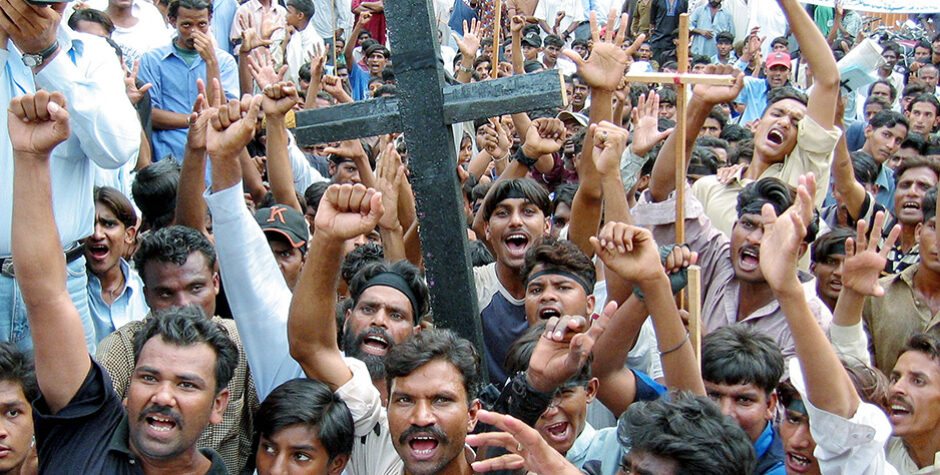Pakistani Court Effectively Ends a Dangerous Blasphemy Case for Christian Client
In an important victory in Pakistan, a trial court has freed an innocent Christian man in a blasphemy case. It’s a case where our European Centre for Law and Justice’s (ECLJ) affiliate in Pakistan, as we’ve previously told you, has been representing a Christian man who was falsely accused of defiling pages of the Quran, a crime punishable with life imprisonment under Pakistan’s law.
Section 295-B is part of the Pakistan Penal Code’s (PPC) chapter on “Offenses Relating to Religion” and states: “Whoever willfully defiles, damages or desecrates a copy of the Holy Qur’an or of an extract therefrom or uses it in any derogatory manner or for any unlawful purpose shall be punishable with imprisonment for life.”
The person who pressed charges against the man had converted from Christianity to Islam in 2019. About six months after his conversion, he accused the Christian man of burning the Quran. However, as is common in many blasphemy cases, the real motive behind the allegation was a personal dispute.
For about eighteen months of numerous court hearings, the Christian man’s accuser never appeared in the court, nor did he provide any further evidence. The court issued several summonses and even a warrant against the accuser to appear and testify, but he failed to do so.
Earlier this week, our attorneys asked the court to adjourn the case sine die, a process under Pakistan’s criminal procedure that allows a judge to stop the proceedings at any stage without pronouncing any judgment either of acquittal or conviction and release the accused. Remarkably, the judge complied and adjourned the case sine die.
Due to the sensitive nature of blasphemy cases, trial courts are often reluctant to dismiss charges at this stage. They are usually under pressure from angry mobs who pack the courtrooms and even threaten judges and lawyers in such cases. As a result, trial court judges often convict the defendants, passing the buck to the higher courts.
We are glad that this innocent Christian man has been released. We spoke with him after the hearing and he expressed his thankfulness to God that he is a free man. If, however, his accuser returns to the court, the likelihood of which is very slim, we are prepared to continue to defend him. In addition to the lack of any evidence against him, the lack of interest in pursuing the case on the accuser’s part also shows that the allegation was baseless.
While this case has a good outcome for now, many accused of such crimes are not so fortunate. Recently, Tabitha Nazir Gill, a 36-year-old female nurse (also a Gospel singer), was accused of blasphemy in Karachi. The real reason behind the allegation was that Tabitha reminded other nurses that they were violating the hospital policy by receiving money from patients. Her co-workers did not like it and accused her of committing blasphemy. A video circulated on social media of women brutally slapping her and demanding that she write an apology. It was reported that the police took her into custody and later released her after finding no evidence against her in an investigation. But later it was reported that the police filed a blasphemy case against her after an angry mob surrounded the police station.
Last December, Christians from the neighborhood of Charrar, Lahore, had to flee their homes after a mob threatened to kill a local pastor and burn down Christians’ homes over an accusation of blasphemy. Around Christmas time, Pastor Raja Waris had shared a Christian post on Facebook, which some Muslims deemed blasphemous. Pastor Waris took down the post and apologized. But the mob gathered and threatened to kill him. In order to calm the mob down, the police registered a blasphemy case against the pastor. In the past, such mobs have killed many and have looted and set on fire many Christian homes over blasphemy allegations.
These incidents show an alarming situation which should cause the Pakistani authorities to take urgent action against mob violence and false blasphemy allegations. Even the Lahore High Court has noted that blasphemy laws are being abused to settle personal scores. See Muhammad Mahboob alias Booba v. The State, P.L.D. 2002 Lahore 587. The court noted that the police readily register cases without checking the veracity of the facts or taking proper guidance from unbiased religious scholars. Id.
The current situation is that, even if the police know that the accusations are baseless, they make arrests and file charges due to threats of mob violence. While the mobs disperse after charges are filed, the charges against innocent people remain. The cases go on and on for years and the accused spend those years in prison. Many are languishing in prison, serving sentences ranging from ten years to life imprisonment, or awaiting appeals on death row.
We hope that the authorities realize how much pain such accusations are causing within the religious minorities. If there is no will to repeal or amend the blasphemy laws, we hope Pakistani authorities will create a mechanism that prohibits filing of charges that turn out to be frivolous after a proper investigation, punishes people who make false accusations, and punishes people who deliberately incite and commit mob violence.
